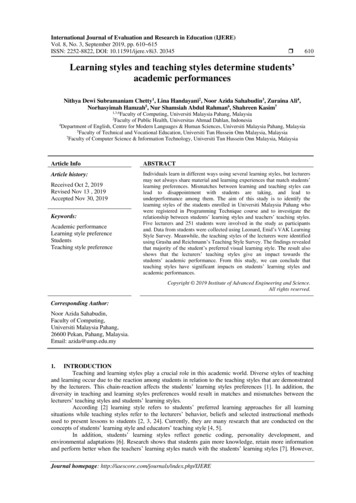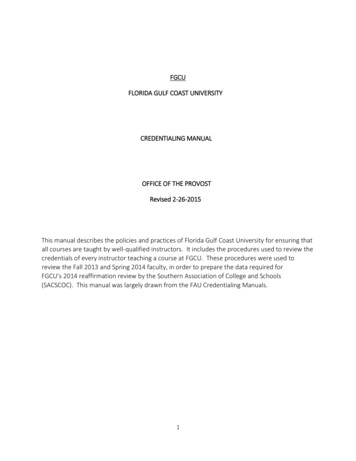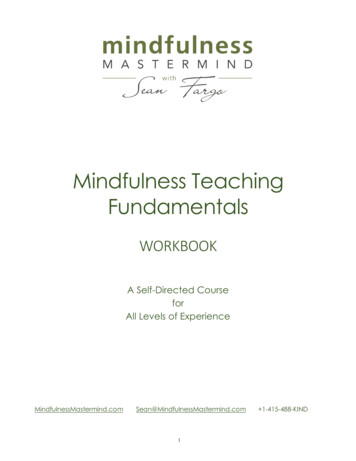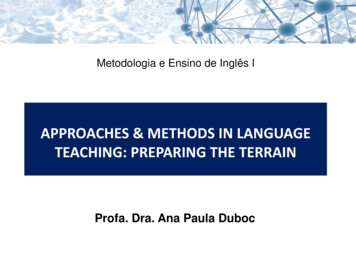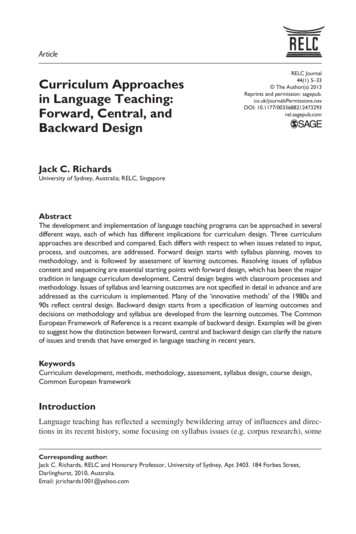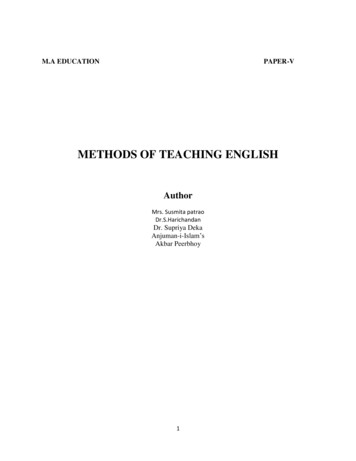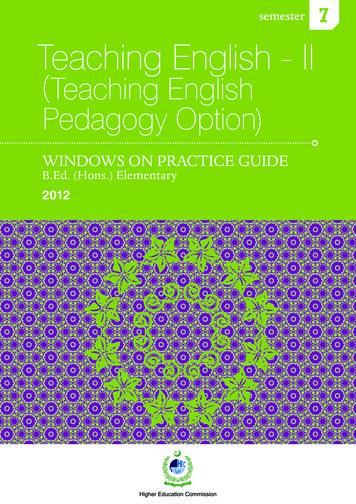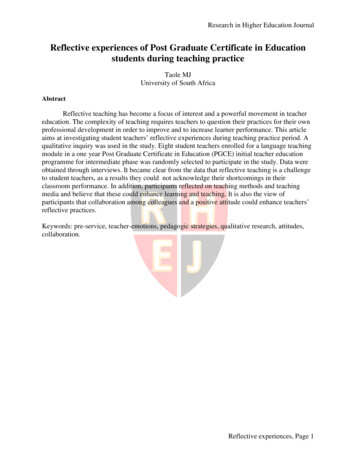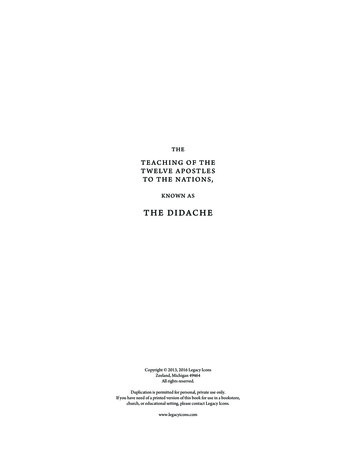
Transcription
THET E AC H I N G O F T H ET W E LV E A P O ST L E STO T H E N AT I O N S,KNOWN AST H E D I DACH ECopyright 2013, 2016 Legacy IconsZeeland, Michigan 49464All rights reserved.Duplication is permitted for personal, private use only.If you have need of a printed version of this book for use in a bookstore,church, or educational setting, please contact Legacy Icons.www.legacyicons.com
D I DACH E2I N T R O D U CT I O NDidache (did-a-key), Διδαχή, or The Teaching of the Twelve Apostles, is an early Christian text thatmost scholars date to the first or early second century.The Didache was highly regarded by many early Christian authors and theologians. Athanasius ofAlexandria (†373) recommended it to converts, and it had a great influence on the Apostolic Constitutions (375). Before the New Testament canon was formally settled in 692, a number of Biblical canonsincluded the Didache; John of Damascus (†749) was also a noted supporter.The text disappeared and was lost for centuries, until it was rediscovered in 1873 by Philotheos Bryennios, Metropolitan of Nicomedia. Today it is usually included among the second-generation Christianwritings known as the Apostolic Fathers.The Didache’s first section, “The Two Ways,” is a treatise on basic Christian theology, morality, andconduct. Catechumens (converts in training) were instructed in its teachings before they were baptized.The second section deals with the administration of several sacraments: baptism, the Eucharist (holycommunion), and anointing with oil.The third section discusses relations among Christians, offering practical instruction in different typesof hospitality. It also gives insight into the clerical hierarchy of the early Church, which included familiarinsitutions like the episcopacy (bishops) and the deaconate (deacons), and also institutions that fell outof use early on, such as prophets (those who spoke in tongues).It should be noted that, at this time in Christian history, there was no distinct class of clergy whowere presbyters (priests). The Christian community was small, and there was not yet a need to delegatea bishop’s priestly duties to lower clergy; bishops personally lead the church in worship in each Christiancommunity.The final section is a brief apocalypse, or revelation of the end times. This is notable, as the Didachewas likely written even before the book of Revelation, which was not universally accepted into the NewTestament until the 7th century.Even though the Didache itself did not find its way into the final canon of the New Testament, it isnevertheless a useful manual for Christian living, even today. The basic teachings of the Gospel are condensed into easily-understood pieces of wisdom and instruction, and insight is gained into first-centuryChristian liturgy and worship.The Didache is a book that all Christians can find profit in. Scripture weaves through the text’s clearteachings, demonstrating why the book was so well-loved and appreciated by the early Church.The
D I DACH E3
D I DACH E4T H E D I DACH E—I—T H E T W O WAY Sare two ways, one of life and one of death, and there is a great difference between the two ways.aThe way of life is this. First of all, you shall love the God who made you. Second, love your neighbor as yourself.b And all things you would not want done to you, do not do to another person.cNow the teaching of these words is this. Bless those who curse you,d and pray for your enemies, andfast for those who persecute you.e For what credit is it to you, if you love those who love you?f Do thepeople of the nations not do the same?g But you should love those who hate you,h and you will not havean enemy.iAbstain from the desires of the flesh and of the body. jIf anyone strikes you on your right cheek, turn the other cheek to him also,k and you will be perfect.lIf anyone compels you to go one mile, go with him for two miles.mIf anyone takes away your coat, give him your shirt also.nIf anyone takes away what is yours,o do not demand its return,p for you cannot.qTo anyone who asks something of you, give it to him, and do not ask for it back,r for the Father desiresthat gifts be given to all from His own riches.Blessed is he who gives charitably according to the commandment, for he is blameless.Woe to him who receives. If a needy man receives charity, he is blameless, but anyone is not in needwill be called to account for why he accepted it. And being imprisoned, he will be interrogated concerninghis actions, and he will not be released until he has repaid every last penny.sIndeed, it has also been said: Let your alms sweat in your hands, until you have discerned to whomyou will give.The reTHE SECOND COMMANDMENTTis the second commandment of the teaching.You shall not murder.tYou shall not commit adultery.uYou shall not be sexually perverse.vYou shall not be sexually promiscuous.wYou shall not steal.xYou shall not practice magic.yhisJer. 21:8; Matt. 7:13. b Lev. 19:18; Matt. 22:37-39. c Matt. 7:12. d Luke 6:28; Matt. 5:44. e Luke 6:27-28; Matt. 5:44. f Luke 6:32. g Luke 6:33; Matt. 5:46-47. h Luke 6:27; Matt.5:44. i 1 Pet. 3:13. j 1 Pet. 2:11. k Matt. 5:39; Luke 6:29. l Matt. 5:48, 19:21. m Matt. 5:41. n Matt. 5:40. o Matt. 5:42; Luke 6:30. p Luke 6:30. q Matt. 5:39. r Luke 6:30; Matt.5:42. s Matt. 5:25, 18:34; Luke 12:58. t Exod. 20:15(13). u Exod. 20:13(14). v Lit. “You shall not corrupt boys.” w Deut. 23:17. x Exod. 20:14(15). y Deut. 18:10.a
D I DACH E5You shall not practice sorcery.zYou shall not murder a child by abortion, nor kill a child at birth.You shall not covet your neighbor’s things.aYou shall not commit perjury.bYou shall not bear false witness.cYou shall not speak evil.dYou shall not bear a grudge.eYou shall not be double-minded nor double-tongued, for the double tongue is a snare of death.fYour words shall not be false or empty, but fulfilled in your actions.You shall not be greedy,g nor a swindler, nor a hypocrite, nor bad-tempered, nor proud.You shall not plot against your neighbor.You shall not hate any man, but you shall reprove some, and you shall pray for others, and others youshall love more than your own life.hTHE “FENCES”My child , flee from every evil thing, and everything that is like it.Do not be angry, for anger leads to murder. Do not be jealous, nor argumentative, nor hottempered; for all of these things give birth to murder.My child, do not be lustful, for lust leads to sexual promiscuity. Do not speak obscenely, and do nothave wandering eyes; for all of these things give birth to promiscuity.My child, do not deal in omens, since it leads to idolatry. Do not be an enchanter, nor an astrologer,nor a magician—do not even be around such things; for all of these things give birth to idolatry.My child, do not be a liar, since it leads to theft. Do not be greedy or vain; for all of these things givebirth to theft.My child, be not a complainer, since it leads to blasphemy. Do not be stubborn nor evil-minded; forall of these things give birth to blasphemy.Be meek, since the meek shall inherit the earth.iBe patient, and merciful, and sincere, and quiet, and kind, and always fearing the words which youhave heard.jDo not praise yourself, and do not let arrogance enter your soul. Do not join your soul with a pompousperson,k but walk only with the righteous and the humble. Whatever happens to you, accept it as good,knowing that nothing is done without God.My child, remember him who proclaims to you the word of God. Remember him night and day,l andhonor him as the Lord; for wherever he speaks, the Lord himself is there.Every day, seek out the company of the saints, that you may find rest in their words.Do not cause division, but bring peace between those who dispute. Judge righteously.m Do not favorDeut. 18:10. n Matt. 5:40. o Matt. 5:42; Luke 6:30. p Luke 6:30. q Matt. 5:39. r Luke 6:30; Matt. 5:42. s Matt. 5:25, 18:34; Luke 12:58. t Exod. 20:15(13). u Exod. 20:13(14).Lit. “You shall not corrupt boys.” w Deut. 23:17. x Exod. 20:14(15). y Deut. 18:10. i Ps. 37:11; Matt. 5:5. j Isa. 66:2. k Rom. 12:16; Jas. 2:2-3. l Heb. 13:7. m Deut. 1:16-17;Prov. 31:9.zv
D I DACH E6one side when you reprove others. Do not be double-minded when you consider whether or not a thingshould be.Do not hold out your hand to receive, only to pull your hand back when you should give. If you havegained something through your work, give it away as a ransom for your sins. Do not hesitate to give, norcomplain when you give, for you know the good paymaster of your reward.Do not turn away from anyone who is in need, but share everything with your your brother, and donot say that anything is your own.n For if you all share in the heavenly things, how much more in earthlythings?Do not relax your control over your son or your daughter, but from their youth teach them the fear ofGod.Do not give a command in your anger to your servant, who trusts in the same God, lest he ceases tofear the God who is over both of you. For he does not call men according to worldly status, but he comesto those whom the Spirit has prepared.And you who are servants, be obedient to your masters as to God, in respect and fear.oHate all hypocrisy, and everything that is not pleasing to the Lord.Never forsake the Lord’s commandments. But you shall guard the things which you have received,neither adding to them nor taking away from them.pConfess your sins in church, and do not go to prayer with a guilty conscience.This is the Way of Life.THE WAY OF DEATHBuT theway of death is this. First of all, it is evil and full of curses: murder, adultery, lust, promiscuity,theft, idolatry, magical arts, witchcraft, robbery, false testimony, hypocrisy, duplicity, treachery, pride,malice, stubbornness, greed, foul language, jealousy, arrogance, pride, and boasting.qPersecutors of good men, hating truth, loving a lie, not knowing the reward of righteousness, notadhering to the goodr nor to good judgment, alert to evil rather than to good; neither gentle nor patient;loving worthless things,s pursuing a reward, not having mercy on the poor, not working for the downtrodden, not recognizing the God who made them, murderers of children, corrupters of God’s creation, turning away from the needy, oppressing the afflicted, advocates of the rich, unjust judges of the poor—sinfulin every way!May you be delivered, my children, from all these things.CONCLUSIONBlest anyone lead you astray from this way of righteousness, for he teaches apart from God.For if you can bear the whole yoke of the Lord, you will be perfect; but if you cannot, do as much asyou can.tne w are ,Acts 4:32. o Eph. 6:1-9; Col. 3:18–4:1. p Deut. 4:2, 12:32. q Matt. 15:19; Rom. 1:29; Gal. 5:20. r Rom. 12:9. s Ps. 4:2; Isa. 1:23. t Epistle of Barnabas 19:8.
D I DACH E7
D I DACH E—II8—I N ST RU CT I O N F O R C AT ECH U M E N SCONCERNING FOODNconcerning eating, observe the traditions as best you can. But do not eat meat sacrificed to idols,for it is the worship of dead gods.uowCONCERNING BAPTISMcoNce rNiNg baptism, baptize in this way. Having instructed him in all of these teachings, baptize thecatechumen in the name of the Father, and of the Son, and of the Holy Spirit, in running water.v Butif you do not have running water, then baptize in other water. And if you cannot in cold water, use warm.But if you have neither, then pour water on the head three times, in the name of the Father, and of the Son,and of the Holy Spirit. And before the baptism, let both the baptizer and the catechumen fast, and also anyothers who are able. And be sure that the catechumen fasts a day or two before.CONCERNING FASTINGdo NoT let not your fasts fall on the same days as the hypocrites,w for they fast on Mondays and Thurs-days. Keep your fast on Wednesdays and Fridays.CONCERNING PRAYERdo NoT pray as the hypocrites either,x but pray as the Lord commanded in His Gospel:Our Father, who art in heaven, hallowed be thy name; thy kingdom come; thy will be done, onearth as it is in heaven; give us this day our daily bread; and forgive us our trespasses, as we forgive thosewho trespass against us; and lead us not into temptation, but deliver us from the evil one; for thine is thepower and the glory unto ages of ages.yPray this way three times each day.CONCERNING THE EUCHARISTconcerning the eucharistic thanksgiving,z give thanks in this way. First, as concerning the cup:We give you thanks, our Father, for the holy vine of your son David,a which you made knownto us through your Son Jesus.b Yours is the glory unto ages of ages.Then as regards the broken bread:We give you thanks, our Father, for the life and knowledgec which you made known to us through yourSon Jesus. Yours is the glory unto ages of ages.As this broken bread was scattered upon the mountains and being gathered together became one,NuowActs 15:29. v Matt. 28:19. w Matt. 6:16. x Matt. 6:5ff. y Matt. 6:9ff. z 1 Cor. 11:23-25. a John 15:1. b Acts 3:13, 26. c John 3:15, 5:26, 6:68ff.
D I DACH E9so may your Church be gathered together from the ends of the earth into your kingdom. For yours is theglory and the power through Jesus Christ unto ages of ages.Do not let anyone eat or drink of this Eucharist who has not been baptized into the name of the Lord,for concerning this the Lord has said, “Do not give the holy things to the dogs.”dAnd after you have been filled, give thanks as follows:We give you thanks, holy Father, for your holy name, which you have made to dwell in our hearts,eand for the knowledge and faith and immortality, which you have made known unto us through your SonJesus. Yours is the glory unto ages of ages.You, Almighty Master, created all things f for your name’s sake, and gave food and drink to men fortheir enjoyment, that they might give you thanks. And you have given us spiritual food and drink andeternal life through your Son.gMost of all, we give you thanks that you are powerful. Yours is the glory unto ages of ages.Remember, Lord, your Church,h and deliver it from all evili and to perfect it in Thy love. Gather it—the sanctified one—together from the four winds j into your kingdom which you have prepared for it. Foryours is the power and the glory unto ages of ages.May grace come and may this world pass away.k Hosanna to the God of David.l If any man is holy, lethim come; if any man is not, let him repent. Mar‘anatha.m Amen.But permit the prophets to offer thanksgiving as much as they desire.CONCERNING THE OINTMENTaconcerning the ointment, give thanks as follows:We give you thanks, our Father, for the fragrant ointment which you have made known to usthrough your Son Jesus. Yours is the glory unto ages of ages. Amen.NdTHE APPROVED TEACHERwand teaches you all these things that have been taught before, receive him. But ifthe teacher himself turns aside and teaches a different doctrine that subverts what has been taughtbefore, do not listen to him.n If his teaching fosters righteousness and the knowledge of the Lord, receivehim as the Lord.odnhoe ve r comesMatt. 7:6. e John 1:14, 6:56-57. f Rev. 4:11. g John 6:27. h Matt. 16:18. i John 17:15. j Matt. 24:31. k Rev. 22:20. l Matt. 21:9, 15. m Hebrew: “Our Lord has come.” 1 Cor. 16:22.Gal. 1:6-9. o Matt. 10:40; John 13:20.
D I DACH E10
D I DACH E—III11—LIFE IN THE COMMUNIT YAPOSTLES AND PROPHETScoNce rNiNg apostles and prophets,p act according to the Gospel’s teaching.q Receive every apostle asthe Lord.r He should not stay for more than a single day, or two days if necessary. But if he remainsfor three days, he is a false prophet. When he leaves, let the apostle receive nothing except bread, until hefinds a place to stay. But if he asks for money, he is a false prophet.rDo not test or judge any prophet who speaks in the Spirit. Every other sin will be forgiven, but this sinwill not be forgiven.s And not everyone who speaks in the Spirit is a prophet, but only he who follows theways of the Lord. From his behavior, then, you will know a false prophet from a true prophet.tAny prophet who orders a meal in Spirit will not eat from it, but if he does eat of it, he is a false prophet.Any prophet who teaches the truth, but does not do the things he teaches, is a false prophet.Every true prophet, if he performs a worldly mystery of the Church, but does not teach others to dolikewise, he must not be judged by you. He has his judgment in the presence of God, as with the prophetsof old.If anyone says in the Spirit, “Give me money,” do not listen to him.u But if he tells you to give to otherswho are in need, let no one judge him.HOSPITALITY TO TRAVELERSeveryone who comes in the name of the Lord.v Examine him and learn the nature of his situation.If he is only passing through, help him as much as you can, but he must not stay with you more than twoor three days.If he wishes to settle with you and knows a trade, let him work and earn his bread.wIf he does not know a trade, use your judgment to decide how he should live as a Christian among you,but not in idleness. If he will not do this, he is trafficking upon Christ.x Beware of such men.re ce iveSUPPORTING GOD’S MINISTERSetrue prophet who desires to settle among you is worthy of his food. Likewise, a true teacher, likethe worker, deserves his food.yTake every firstfruit of the winepress and of the threshing floor, of your oxen and of your sheep, andgive as the firstfruit to the prophets, for they are your high priests.z But if you do not have a prophet, giveyour firstfruits to the poor.ve ry1 Cor. 12:28; Eph. 3:5. q Matt. 7:15ff, 10:40-41; Luke 10:4ff. r Matt. 10:40; John 13:20. s Matt. 12:31. t 2 Pet. 2:1; John 4:1. u Matt. 10:8. v Ps. 118:26; Matt. 21:9. w 2 Thess.3:10; Acts 18:3. x 1 Tim. 6:5. y Matt 10:10; 1 Tim. 5:18. z Deut. 18:1-5.p
D I DACH E12If you make bread, take the firstfruit and give according to the commandment. Likewise, when youopen a jug of wine or oil, take the firstfruit and give to the prophets. And so with money, and clothing, andevery possession—take the firstfruit, as it seems appropriate to you, and give according to the commandment.THE SACRIFICEgaThe r together each Sunday,a break bread and give thanks, first confessing your sins, that your sac-rifice may be pure.And let no man, having a disagreement with his brother, join you until they have been reconciled, thatyour sacrifice may not be defiled.b For it was this sacrifice that was spoken of by the Lord: “In every placeand at every time offer me a pure sacrifice;c for I am a great king, says the Lord, and my name is wonderfulamong the nations.”dCHURCH LEADERSap p oiNT for yourselves bishops and deacons who are worthy of the Lord: men who are meek and notlovers of money, and who are honest e and proven. For they also perform the service of the prophets and teachers.f Therefore, do not hold them in contempt, for they are honorable men along with theprophets and teachers.COMMUNITY DISCIPLINErone another, not in anger but in peace, as you find in the Gospel. Shun anyone who hassinned against his neighbor; do not say a word to him until he repents.g But say your prayers, andgive your alms, and do everything according to the Gospel of our Lord.he p roveReceive a printed copy of this bookFREE!with any purchase at LegacyIcons.comUse coupon code FREEBOOK at checkoutLimit 1 per customer. Not for use in combination with other offers.aRev. 1:10. b Matt. 5:23. c Mal. 1:11. d Mal. 1:14. e 1 Tim. 3:2-13; Tit. 1:5-9. f Eph. 4:11-12. g Matt. 5:22-26, 18:15-35. h Matt. 6:1-15.
D I DACH E—IV13—THE LORD IS COMINGover your life. Do not let your lamps burn out, nor your waist be ungirded,i but be ready,for you do not know when our Lord is coming.j And gather together frequently, seeking what isnecessary for your souls, for all your years of faith will count for nothing unless you are perfected in thelast days.kIn the last days, false prophets and corrupters will multiply,l and the sheep will turn into wolves,and love will be turned into hate.m As lawlessness increases, men will hate and persecute and betray oneanother.n And then the Deceiver of the world will appear as a son of God, and will do signs and wonders,oand the earth will be delivered into his hands. He will commit abominations which have never been seensince the world began.p Then all mankind will come to the fire of testing,q and many will fail and perish.rBut those who endure in their faith will be saveds by him who was accursed.tAnd then shall the signs of the truth appear: first a sign of a rift in the heavens,u then a sign of a voice ofa trumpet,v and thirdly the resurrection of the dead.w Yet not of all, but as it was said:wa TchThe Lord shall come and all his saints with him.xThen shall the world see the Lord comingupon the clouds of heaven with powerand dominion y to repay each manaccording to his works,z withjustice, before all menand the angels.aM eN.Luke 12:35. j Matt. 24:42, 44; Mark 13:35; Luke 12:40. k Epistle of Barnabas 4:9. l Matt. 24:11. m Matt. 24:12. n Matt. 24:10; 2 Pet. 3:3. o Mark 13:22; 2 Thess. 2:4, 9.Dan. 12:1; Mark 13:19; 2 John 7; Rev. 12:9, 13:2, 19:20. q 1 Pet. 4:12. r Matt. 24:10, 13. s Mark 13:13. t Gal. 3:13. u Matt. 24:30. v Matt. 24:31; 1 Thess. 4:16. w 1 Cor.15:52. x Zech. 14:5. y Mark 13:26. z Ps. 62:12; Matt. 16:27.ip
D I DACH E14
D I DACH E15E A R LY H Y M N S & P R AY E R STo sup p le M e NT the ancient Christian teachings in the Didache, we have included below a selectionof early Christian hymns and prayers, dating to the first few generations of the Church. Timeless intheir beauty, many of these are still used and still inspire Christians today.GLORY TO GOD IN THE HIGHEST1st – 3rd centurygto God in the highest, and on earth peace, goodwill towards men.We praise you, we bless you, we worship you, we glorify you, we give thanks to you for yourgreat glory.O Lord, heavenly King, God the Father Almighty, O Lord, the only-begotten Son, Jesus Christ, andthe Holy Spirit.O Lord God, Lamb of God, who takes away the sins of the world, have mercy on us.You who take away the sins of the world, accept our prayer.You who sit at the right hand of the Father, have mercy on us.For you alone are holy, you alone are the Lord, O Jesus Christ, to the glory of God the Father. Amen.loryMORNING HYMN1st – 3rd centuryeday I will bless you; I will praise your name forever; yes, forever and ever.In your goodness, O Lord, keep me from sin today.You are blessed, O Lord, the God of our fathers,ve ryYour name is praised and glorified forever. Amen.EVENING HYMN1st – 2nd centuryojoy ful Light of the holy glory of the immortal Father,the heavenly, the holy, the blessed Jesus Christ,now that we have come to the setting of the sun, and see the light of evening,we praise the Father, Son, and Holy Spirit: God.It is right at all times to worship you with joyful voices,O Son of God and Giver of life: For which the whole world glorifies you.
D I DACH E16EASTER HYMN2nd – 3rd centurychrisT is risen: Hades is in ruins.Christ is risen: the demons are fallen.Christ is risen: the angels rejoice.Christ is risen: the tombs are empty.Christ is risen from the dead indeed,the first among those who have fallen asleep.Glory and power are his forever and ever. Amen.ANAPHORA HYMN2nd – 3rd centuryholy , holy, holy Lord of Hosts,Heaven and earth are full of your glory.Hosanna in the highest!Blessed is he who comes in the name of the Lord.Hosanna in the highest!COMMUNION HYMN4th centuryTis his blood, who took flesh of the holy Virgin: Jesus Christ.This is his blood, who was born of the God-bearing holy one: Jesus Christ.This is God’s blood, who was seen by men and from whom demons fled: Jesus Christ.This is his blood, who offered himself a sacrifice for our sins: Jesus Christ.hisA PRAYER OF THENEWLY–BAPTIZED4th centuryaGod, Father of Christ your Son, give me a clean body, a pure heart, a watchful mind, andknowledge free from error. May your Holy Spirit come to me and bring me truth—yes, to the fullness of truth—through your Christ. The glory is yours, through him, in the Holy Spirit, forever and everand ever. Amen.lM ighTyPRAYER OF ST. IGNATIUSAT HIS MARTYRDOMad 107Ithe wheat of God. May I be ground up by the teeth of the wild beasts until I become the fine breadof Christ. My sinful passions are crucified, there is no burning in my flesh. A stream murmurs andflows deep down inside me. It says: Come to the Father.aM
D I DACH EDOXOLOGYyare due praise,You are due hymns,You are due glory:Father, Son, and Holy Spirit,Forever and ever and ever.Amen.ouglory To god for all ThiNgsaM e N17
DIDACHE 2 INTRODUCTION T he Didache (did-a-key), Διδαχή, or !e Teaching of the Twelve Apostles, is an early Christian text that most scholars date to the rst or early second century. The Didache was highly regarded by many early Christian authors and theologians. Athanasius of Alexandria (†373) recommended it t
